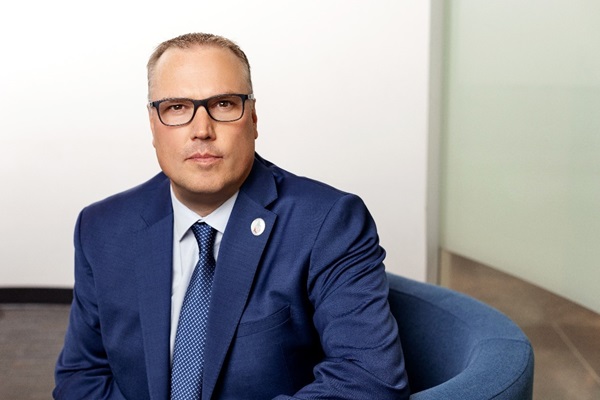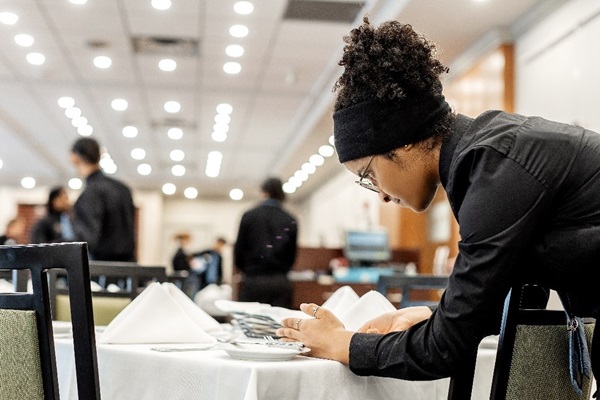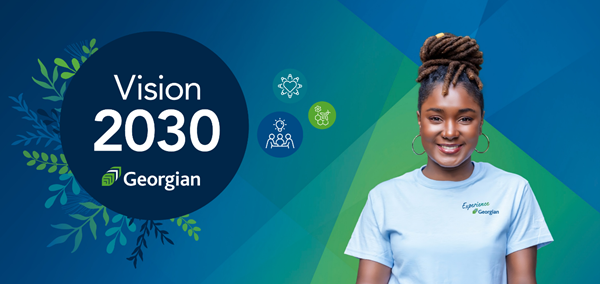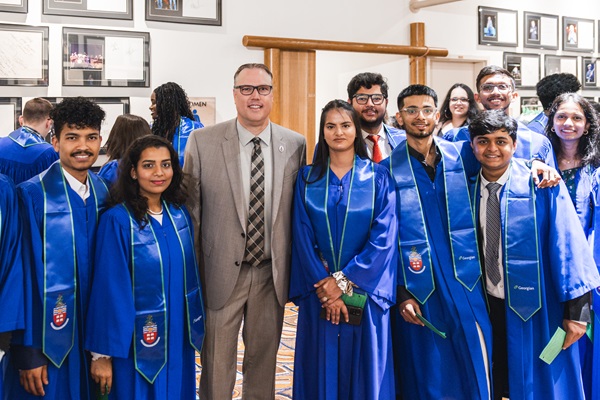Organizational transformation at Georgian
Nov. 18, 2024
This is a period of significant ambiguity, uncertainty and disruption at the college and across the postsecondary sector. Georgian continues to meet the challenges we face with curiosity, determination, imagination and a steadfast commitment to meeting the evolving needs of our students, employers and the communities we serve.
We’re focused – as we always are – on leading with innovative solutions, reframing obstacles as opportunities, tapping into our collective resourcefulness, and strengthening our organizational resilience and sustainability. – Kevin Weaver, President and CEO

Federal policy shifts and their impact
Immigration, Refugees and Citizenship Canada introduced sweeping and substantial changes this year with great consequence to students, our college, employers and communities. Among them:
- Jan. 22 – major reforms to the International Student Program, introducing a cap, new attestation letter process and adjustments to spousal work permits.
- April 29 – changes in the number of hours international students can work off campus.
- Sept. 18 – new and expansive measures related to international students, post-graduation work permits and foreign temporary workers.
- Oct. 4 – updated Classification of Instructional Program Codes, narrowing the list of programs meeting the requirements for a post-graduation work permit.
- Oct. 24 – reduced immigration levels from 2025-27, anticipated to result in a reduced number of international students being successful in their applications for permanent residency.
The changes earlier this year resulted in a decline of international enrolment at Georgian of about 30% compared to fall 2023. The changes this fall further complicate our enrolment – and subsequently our budget – situation for the future. We now face a projected financial gap of approximately $45 million for 2025-26, largely due to an estimated 15% drop in revenue.
What the latest changes mean
Those in programs at public colleges will remain eligible for a post-graduate work permit of up to three years if they graduate from a field of study linked to occupations currently facing long-term labour shortages. An assessment of the government’s changes regarding labour-market alignment – which were made from a national not regional lens – indicates many of our programs that attract and rely on international students aren’t captured in the eligibility. At this point, 35 of our 130+ programs are eligible. This will have immediate impacts on the sectors our communities and residents rely on the most.

Hospitality in Simcoe, Muskoka, Grey and Bruce counties is a major driver for the local economy, but hospitality programs were left off the eligibility list.
These changes threaten small business owners’ and large employers’ ability to fill critical labour gaps and jeopardize the integrity of the talent pipeline relied on across our region. They also have immense repercussions on our enrolment and budget as we look ahead at the coming years and as international applicants try to make decisions about what’s next.
Georgian’s response
We’re gravely concerned these reforms will have a lasting and detrimental influence on the stability and sustainability of the communities we serve, and on our effectiveness as a college. While we understand the federal government’s intent of reducing temporary migrant flows to Canada, destabilizing strategic local talent pipelines and risking the potential closure of our programs isn’t the way.
We’ve encouraged the government to consult with the provinces, industry and postsecondary institutions to ensure local labour-market needs are fully considered within the scope of the post-graduation work permit program. We’ve also been actively engaged in sector-wide advocacy.
Georgian is not alone in the challenges we face, in the conversations we’re having and in the decisions we’re making. Every postsecondary institution in Canada is grappling with the consequences of these changes. – President Weaver
Internal measures
- Though we haven’t cancelled any programs to date – we’ve introduced new and renewed programs – we suspended intakes and combined some classes. We did have to cancel the fall 2024 and all subsequent intakes of our Georgian@ILAC public-private partnership with the International Language Academy of Canada. Given Georgian@ILAC students are no longer eligible for a post-graduate work permit, the appeal of our partnership significantly diminished.
- As we pursue new and innovative ways of working and collaborating, we’re amalgamating certain areas and transforming others to streamline operations.
- Our team continues to look for optimizations, efficiencies and creative revenue-generating opportunities.
- Our intention is to minimize the impact on our people but as part of college-wide efforts to manage our budget, over the past several months we implemented reductions in staffing through a combination of measures. Since the initial announcement by IRCC in January, 146 positions across the college have been impacted. These staffing decisions weren’t made lightly and we’re supporting affected employees through the transition.
Continuing to invest in our future
While it seems difficult to reconcile with our losses, we’re moving forward on some strategic investments and planning for our future. This is essential to maintaining our competitiveness as a college and being home to facilities that not only support student success but inspire creativity and innovation.
We also continue to move ahead with the development of our next strategic plan, Vision 2030, which we’ll launch in April. Nothing guides us more in challenging times or times of uncertainty than having a strong strategic plan to help us prioritize and align our efforts.

Why we need international students and Georgian grads
College graduates are the backbone of Ontario’s economy and Georgian graduates are a strategic talent pipeline for many employers in Central Ontario. Our international students and graduates have supported our local labour force while helping to grow and strengthen our regional economy.
Georgian is committed to continuing to deliver the workforce our province needs and to meet critical shortages in areas including health care, the skilled trades, advanced manufacturing, hospitality and technology. We’re trusted and experienced workforce development partners who deeply listen and respond to the needs of local employers and our community.

Employers hire and rely on Georgian grads. Our graduate employment rate is 90.3% – this means 90.3% of our alumni found work within six months of graduation. We’ve exceeded the provincial average for 25 years (2022-23 key performance indicators). This is a clear and steady indicator of the alignment and relevance of our programs to labour market and community needs.
Our graduates are also proven contributors in our region. Approximately 55% of our 110,000 alumni live, work and play in Central Ontario.
Georgian’s total annual impact in our catchment area is $1.7 billion, which means 1 out of every 15 jobs in the region is supported by our presence. Our alumni impact alone accounts for $1.4 billion (Lightcast, 2022-23).
What’s next?
Georgian continues to work through the development of our 2025-26 budget. Forecasts and projections are all subject to change as they’re tied to a rapidly shifting and dynamic international market context, which is making it extremely difficult to predict where we’ll land. As we continue to assess our financial outlook, further adjustments may be necessary to stay aligned with our strategic objectives and to ensure we stay on track to meet our goals.
None of this deters from our commitment to serve our students, local employers and communities nor our mission to transform lives. We’ll continue to be a strategic partner and leader in meeting the needs of Central Ontario.
I remain confident in Georgian’s future and the collective impact we can continue to make – together. – President Weaver
This article was originally published on Nov. 18, 2024. It was updated on Dec. 2, 2024.